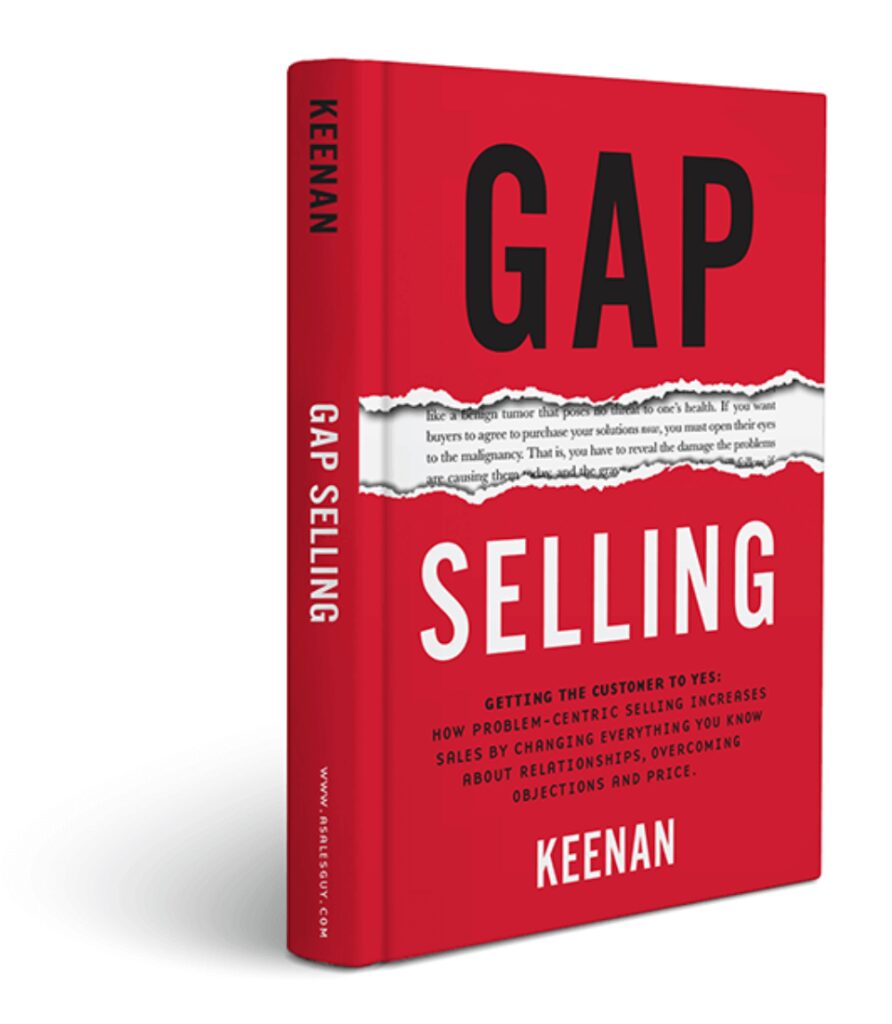As Gap Selling has crossed the milestone of 50,000 copies sold, we are highlighting some of our favorite books to compliment your Gap Selling journey.

Today’s book highlight goes to The End of Average. Like Execution, this isn’t a sales book at all. Written by Todd Rose, a professor of developmental psychology, The End of Average breaks down the history and failures of boiling life and decisions down to averages.

So you may be wondering what developmental psychology has to do with sales right now…and the answer is simple: it relates to the idea of a value proposition.
One of my favorite slides from Gap Selling Training is about value:
“Value: as a word doesn’t mean anything. It’s a placeholder, a catchphrase for something dynamic, contextual and requires acknowledgement from others. So when we whip around the word value, we’re not offering much insight. Value for one person is different for another. Value changes from product to product, service to service, idea to idea, and offer to offer. Value isn’t a thing; it’s an agreement.” – Keenan, Gap Selling Training
The sales profession has become comfortable with the one-size-fits all value proposition. AKA, the average value.
The End of Average is an incredible read to break away from ideas around average.
Story after story, example after example, The End of Average will help shift your mindset away from the elevator pitch, generic demos, and into the real word of value.
AVERAGING TO FAILURE
“In the late 1940s, the United States Air Force had a serious problem: its pilots could not keep control of their planes…At first, the military brass pinned the blame on the men in the cockpits, citing ‘pilot error’ as the most common reason in the crash reports…Pilots, too, were baffled. The only thing they knew for sure was that their piloting skills were not the cause of the problem.
After multiple inquiries ended with no answers, officials turned their attention to the design of the cockpit itself. Back in 1926, when the army was designing its first-ever cockpit, engineers had measured the physical dimensions of hundreds of male pilots (the possibility of female pilots was never a serious consideration), and used this data to standardize the dimensions of the cockpit.
For the next three decades, the size and shape of the seat, the distance to the pedals and stick, the height of the windshield, even the shape of the flight helmets were all built to conform to the average dimensions of a 1926 pilot.”
As this story continues, the military engineers begin exploring this concept of design decisions based on the average. They give this research question to a young, newly hired 23 year old scientist, Lieutenant Gilbert S. Daniels, where he begins measuring 4,063 pilots on 10 key sizing areas. He also decided to create an average range vs a true average, targeting the middle 30% of the range of values for each dimension.
His goal was simple: how many people are actually average across all 10 measurements?
The answer? ZERO!
“Out of 4,063 pilots, not a single airman fit within the average range on all ten dimensions.” Daniels further discovered that even if he went with only 3 of the 10 dimensions, he still only landed at less than 3.5% of pilots fitting within the middle range.
This rather groundbreaking research has led to the technologies we all enjoy today even within our vehicles. If you ever wondered about all of the seat controls and telescoping steering wheel lever in your car, it all stems from Daniel’s research, which ultimately did resolve the military’s problem too. The pilots when given the ability to custom fit their controls were suddenly able to keep control of the plane.
THE END OF AVERAGE MEETS GAP SELLING
Within Gap Selling’s notion of Problem Identification, the methodology challenges salespeople to first understand the customer profiles from a general or average business position (AKA, know what you should measure) and then challenges salespeople to use discovery to then actually measure.
As readers push to the demo/presentation content, Gap Selling teaches you to tailor that demo to that buyer. No more averages. No more general. No more “companies like you” or “average customers.” It is the sales version of your telescoping steering wheel.
Similar to the military’s issue of diagnosing why their skilled pilots continued to crash, salespeople face this too in their professional world. They are driving a technically competent process most of the time and they have the foundational piloting skills. The failure is within the approach of average.
EXPANDING THE CONCEPT…
The End of Average author, Todd Rose, walks readers through example after example of how our decisions made on averages are misguided. He demonstrates the impacts across hiring talent, gaining business competitive edge, even understanding and mapping the human brain.
“The goal of this book is to liberate you, once and for all, from the tyranny of the average” – Todd Rose
IF YOU OR YOUR SALES TEAM ARE READY TO STOP BEING AVERAGE REACH OUT TO OUR SALES TEAM.




0 Comments